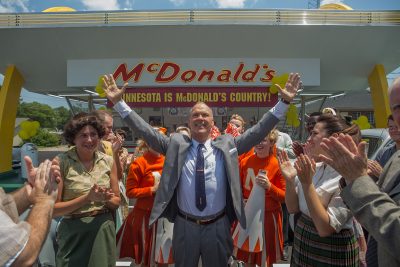
McDonald’s may be a household name, but many customers fail to recognize that it is also a name wrought with the frequent trials and painful tribulations of a business growing faster than its original owners could have ever anticipated.
“The Founder,” misleading as the title is, follows the rise and eventual domination of Ray Kroc (Michael Keaton), a down-and-out middle-aged milkshake machine salesman who stumbles upon a new burger stand with quick and friendly service. He eventually transforms it into a massive and unconquerable franchise. The McDonald brothers, Dick (Nick Offerman) and Mac (John Carroll Lynch) are slowly phased out of a business they spent years refining and cultivating.
Based on a true story, “The Founder” takes viewers deep into the metaphorical fryer of the restaurant business in a way that is engaging and at times exhilarating, concluding with the enormous success of one man and the stolen opportunities of countless others. In a story that relies heavily on the performances of the characters, the film articulately demonstrates the massive gains and painful losses of a mecca in the fast food industry.
Kroc is fast-talking and suspiciously slick, presenting an inescapable sensation of distaste like that of hamburger grit stuck between one’s teeth or a growing grease stain on a crisp, new shirt. Beginning with his initial pitch — a breaking of the fourth wall in which his weathered face and determined expressions stare down audiences and his targeted client — it is evident that Kroc’s most effective and positive quality is persistence. He is, as described by Mac McDonald, a “professional leech,” sucking the blood out of a family business and the joy out of a startup story.
Nevertheless, as the film progresses, that persistence feels worn out and insufferably relentless, making the performance, while excellent and worthy of attention, hard to watch. Unlike other smooth-talking cinematic villains of the film of yesteryear, Kroc becomes almost robotic and excruciatingly manipulative. The performance, while likely accurate in its characterization of Kroc, lacks any redeeming qualities for viewers to find him likeable.
Dick and Mac are, by stark contrast, sweet, friendly and ethical. Together, the two carry a familial chemistry that is reassuring. Even as the film progresses into difficult business deals and taunting from Kroc, the McDonalds hold on to their values, not once abandoning their personal bond for a more lucrative offer.
A particular scene is drawn to mind, where Mac and Dick tell the story of how they found themselves working in Hollywood just prior to the Great Depression and in possession of a movie theatre. Following slow business there, they attempted to make it in the drive-in restaurant business, but ultimately revamped the design to offer faster service and a unique spin on hamburgers and fries. The tale is painted in such an enticing way, with the juxtaposition of interjections from the brothers into each other’s sentences and quick cuts from the table where they sit and the location of their story, that one can’t help but get excited and starry-eyed at the sheer concept of such an opportunity.
Eager and strong-willed as they are, Dick and Mac’s bond makes the fall of their small family business even more difficult to bear. Ingenuity only carries the inspirational component of the film so far, and the pain their ultimate loss brings proves the film is far from thoroughly “feel-good.”
Despite the lack of a motivational and simple message — while “persistence” is a retaining theme, it exists for less-than-savory reasons — the movie is of substantial quality, and the introduction of several characters throughout the nearly two-hour run time invigorates a worn-out seediness inherent to Kroc as a character. Ethel Kroc (Laura Dern) echoes the concerns some viewers may feel regarding Kroc’s excitability, while Harry J. Sonneborn (B.J. Novak) amplifies Kroc’s manipulative characteristics.
The film excites, but it also has painful surprises, presenting audiences with little motivation to patronize their nearest McDonald’s any time soon. For no other reason than to gain an appreciation for the inner workings of the iconic fast-food conglomerate, the movie is a recommended watch. Just don’t walk into the theater expecting to be inspired to jump eagerly onto the grill of any new business deal.

















































































































